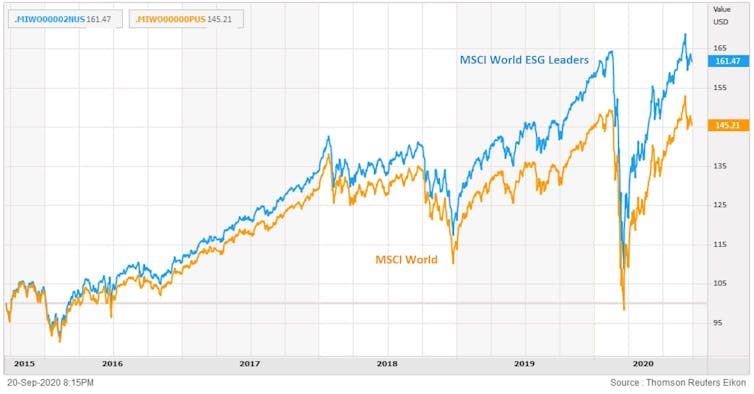What can savers expect from "socially responsible" investing?
Awareness of environmental damage and scandals related to working conditions in developing countries by certain subcontractors of large corporations have prompted many investors to use their savings to influence corporate practices.
Pascal Nguyen, University of Montpellier

Investment products described as "socially responsible" (or SRI) have thus developed rapidly. These are also identified by the three letters ESG, reflecting their threefold focus: environmental, social, and corporate governance issues. More than 500 certified funds are currently available in France through the main financial intermediaries. Their performance can be tracked on the Boursorama website.
According to figures from the Global Sustainable Investment Alliance, ESG-driven investments now account for nearly $30 trillion worldwide, corresponding to approximately 10% of total financial assets under management.
And interest in this segment shows no sign of waning. Many asset management companies are launching new SRI-labeled funds, when they are not deciding to devote themselves entirely to this type of investment.
Savers now have access to a wide range of investment products, including both stocks and bonds, particularly green bonds.
See also:
Green bonds, a financial instrument to protect the environment
They can also invest in exchange-traded funds, known as trackers, which aim to replicate the composition of stock market indices such as the Dow Jones Sustainability North America in the United States or the MSCI Europe ESG Leaders on this side of the Atlantic.
The Covid-19 crisis as an accelerator
Driven by ethical concerns, SRI initially sought to exclude companies involved in socially reprehensible activities—such as the sale of alcohol or tobacco, or the arms trade—before favoring companies that were more respectful of the environment or human rights and offered good working conditions to their employees.
However, the difference with conventional investment has long seemed marginal due to the difficulty in obtaining the necessary data or ensuring its reliability.
With non-financial information becoming more comprehensive and of higher quality in response to persistent demand from investors, it is now possible to better identify responsible and irresponsible companies, suggesting that differences will become more pronounced in the future.
The Covid-19 crisis seems to have acted as a real catalyst, with ESG funds standing out thanks to significantly higher performance spreads in their favor.

Thomson Reuters Eikon
How are ESG portfolios constructed?
To build their portfolios, ESG funds typically start by selecting a set of social and environmental indicators. These may relate to the amount of energy consumed in manufacturing or transporting products, or the amount of greenhouse gases emitted by the company.
These indicators come either from non-financial performance statements made by companies or from surveys conducted by analysis and information companies such as Bloomberg or Thomson Reuters, for example.
The indicators collected are often adjusted to take into account differences between sectors. They are then weighted to give an overall score. Companies with the lowest scores, deemed to be the least socially responsible, are excluded.
The funds then use a traditional financial approach based on risk and expected return to determine which of the remaining companies to include in their portfolios and in what proportion. Some companies are thus overweighted compared to a scenario where no ESG criteria had been taken into account. Others are underweighted or even absent from the portfolios.
SRI certification by labels
A fund's commitment can be certified by obtaining a label. In France, for example, the SRI label is supported by the Ministry of Economy.
Certification is based on verification that the fund takes into account the social and environmental performance of companies in its investment criteria, that it is equipped to do so, and that its selection process is rigorous.
Finally, the difference must be material, meaning that the resulting portfolio must indeed consist of companies with superior ESG performance compared to those that were not selected.
What impact can SRI have?
At first glance, ESG portfolios do not appear to be very different from conventional portfolios. They even include companies that have been the subject of controversy. For example, Amazon, whose working conditions are often criticized by unions, has nevertheless been included in the S&P 500 ESG Index. The same is true of Facebook, even though the company is known for its misuse of its users' personal data.
This is because the rating reflects the company's relative performance within its sector. Some sectors are relatively polluting or consume large amounts of natural resources. For the sake of balance, no sector can be excluded or even significantly underweighted, as this could affect portfolio profitability.
However, reducing the share of the lowest-rated companies helps to curb their growth. Conversely, the highest-rated companies—such as Danone, Schneider, Air Liquide, and L'Oréal, which are part of the STOXX Europe ESG Leader 50 index—benefit from better access to the financial market. Empirical studies confirm that these companies can raise funds more easily and at a lower cost.
But it is passive investment, based on the replication of recognized ESG indices, that is likely to have the most significant impact. Firstly, because it now accounts for the largest share of funds invested in equities thanks to minimal management fees.
The fact that ESG indices tend to include only the best-performing companies means that these companies are likely to receive considerable funding. Conversely, other companies will find it much more difficult to appear on investors' radar. This is a powerful incentive for them to improve their practices.
There is no doubt today that responsible investment is set to have a major impact on the economy. Savers who want to put their money to good use can invest with confidence in index funds that are broadly defined so as to be sufficiently diversified. The recent results show that their performance is on par with conventional funds and their risk is even lower.![]()
Pascal Nguyen, Professor at the University of Montpellier, University of Montpellier
This article is republished from The Conversation under a Creative Commons license. Readthe original article.